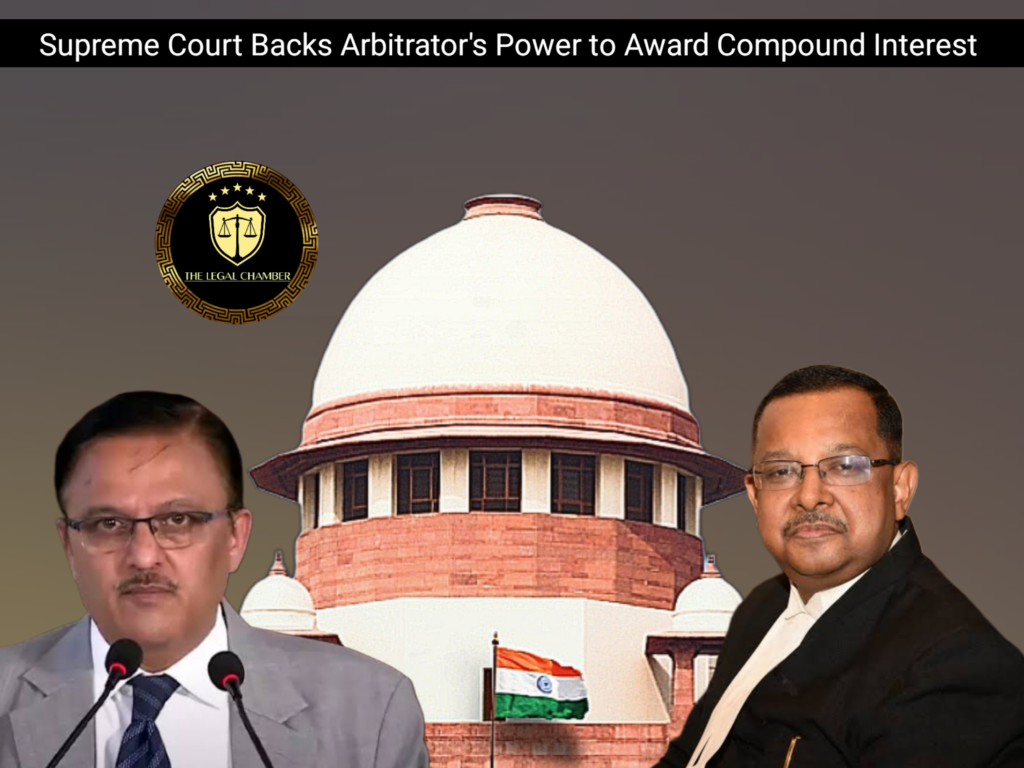
The Supreme Court ruled that arbitral tribunals have the power to award compound interest (interest on interest) under Section 31(7) of the Arbitration Act, 1996. It clarified that the “sum awarded” includes both principal and pre-award interest, and post-award interest can be calculated on this total amount. The judgment overruled earlier contrary interpretations, affirming arbitrators’ discretion in interest calculations unless expressly barred by contract. The Court emphasized this aligns with the compensatory purpose of arbitration awards for delayed payments.
Facts Of The Case:
The case involved a contractual dispute between M/s Interstate Construction (appellant) and National Projects Construction Corporation Ltd. (respondent) regarding construction work for Ramagundam Super Thermal Power Project in 1984. After completing the work in 1987, the appellant raised claims for unpaid dues and invoked arbitration in 1993 due to disputes over recoveries. The arbitration process saw multiple arbitrator appointments and delays spanning decades. In 2020, the arbitral tribunal awarded the appellant ₹34.43 lakhs with interest – 18% pre-reference interest (1987-1998), 12% pendente lite interest (1998-2008 and 2017-2020), and 18% future interest, while denying interest for 2009-2016 due to appellant’s delay. The respondent challenged the award before Delhi High Court, particularly opposing the tribunal’s method of calculating pendente lite interest on the principal plus pre-reference interest (compound interest). The Single Judge partly modified the future interest rate to 9% but upheld other aspects. The Division Bench set aside the compound interest calculation, prompting the appellant’s appeal to the Supreme Court. The core dispute centered on whether arbitrators could award compound interest under Section 31(7) of the Arbitration Act, with the Supreme Court ultimately upholding the tribunal’s discretion in this matter.
Procedural History:
The procedural history began when M/s Interstate Construction invoked arbitration in 1993 over payment disputes with NPCC. The arbitration saw multiple arbitrator appointments – first Shri Shivamoy Ghosh (1997), replaced by Shri A.S. Chandhiok (2004) after court intervention, and finally Justice R.C. Jain (2018) following resignations. The arbitral tribunal delivered its award in October 2020, granting claims with compound interest. NPCC challenged this under Section 34 of the Arbitration Act before Delhi High Court, where the Single Judge in August 2021 upheld most of the award but reduced future interest to 9%. NPCC then appealed under Section 37 to the Division Bench, which in August 2023 set aside the compound interest component. Interstate Construction’s subsequent special leave petition was admitted by the Supreme Court in October 2023, culminating in the May 2025 judgment that overturned the Division Bench’s decision and restored the arbitral tribunal’s original award with compound interest. The Supreme Court’s ruling settled the legal position after nearly three decades of litigation.
READ ALSO : No Relaxation in OBC Certificate Requirements: Supreme Court Rules Against Candidates for Wrong OBC Certificate Format
Court Observation:
The Supreme Court made several crucial observations while overturning the Delhi High Court’s judgment. It emphasized that Section 31(7) of the Arbitration Act, 1996 grants arbitral tribunals discretionary power to award compound interest (interest on interest) unless expressly barred by contract. The Court clarified that the “sum awarded” includes both principal and pre-award interest, and post-award interest can be calculated on this consolidated amount. It observed that the distinction between pre-reference and pendente lite periods is immaterial under the 1996 Act, as both fall within the single continuum from cause of action to award date. The Bench noted that arbitrators may vary interest rates for different periods and exclude lapses periods (like 2009-2016 in this case) while maintaining overall compensatory intent. Significantly, the Court overruled the High Court’s rigid interpretation, affirming that compound interest serves justice by fully compensating for prolonged deprivation of funds. These observations reinforce arbitration as an effective dispute resolution mechanism while upholding tribunal autonomy in awarding equitable remedies.
Final Decision & Judgement:
The Supreme Court allowed the appeal and set aside the Delhi High Court Division Bench’s judgment dated August 1, 2023. The Court restored the arbitral tribunal’s original award dated October 28, 2020, which had granted compound interest to M/s Interstate Construction. The Bench held that arbitral tribunals have the authority under Section 31(7) of the Arbitration and Conciliation Act, 1996 to award interest on interest (compound interest) as part of their discretionary powers, unless expressly prohibited by the contract between parties. The judgment clarified that the “sum directed to be paid” under Section 31(7)(b) includes both the principal amount and any pre-award interest accrued. The Court emphasized that this interpretation aligns with the compensatory purpose of arbitration awards and ensures complete redressal for parties who suffer financial losses due to delayed payments. The decision overruled the High Court’s contrary view and reaffirmed the tribunal’s methodology of calculating pendente lite interest on the principal plus pre-reference interest amount. No costs were awarded in the proceedings. Justice Ujjal Bhuyan authored the judgment, with Justice Abhay S. Oka concurring, delivering the final verdict on May 15, 2025.
Case Details:
Case Title:M/s. Interstate Construction vs. National Projects Construction Corporation Ltd. Citation:2025 INSC 699 Civil Appeal No.:Civil Appeal No. 3461 of 2025 Date of Judgment: May 15, 2025 Judges/Justice Name: Justice Ujjal Bhuyan & Justice Abhay S. Oka
Download The Judgement Here